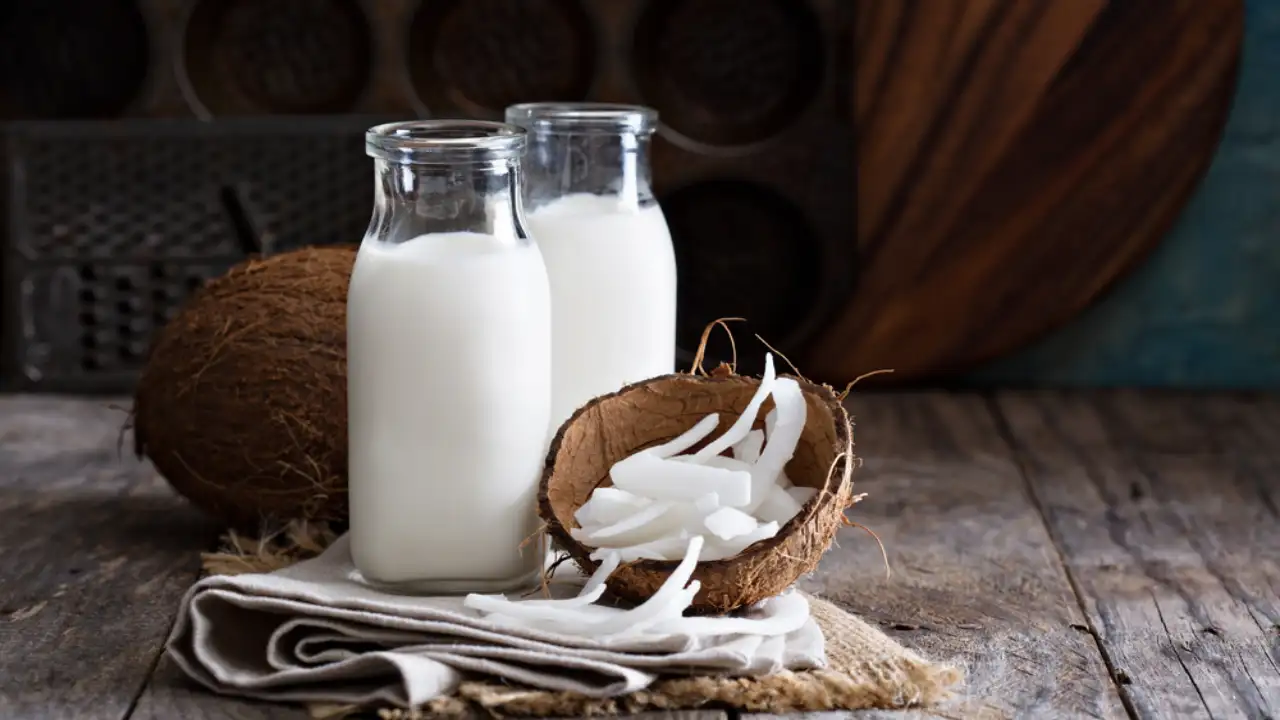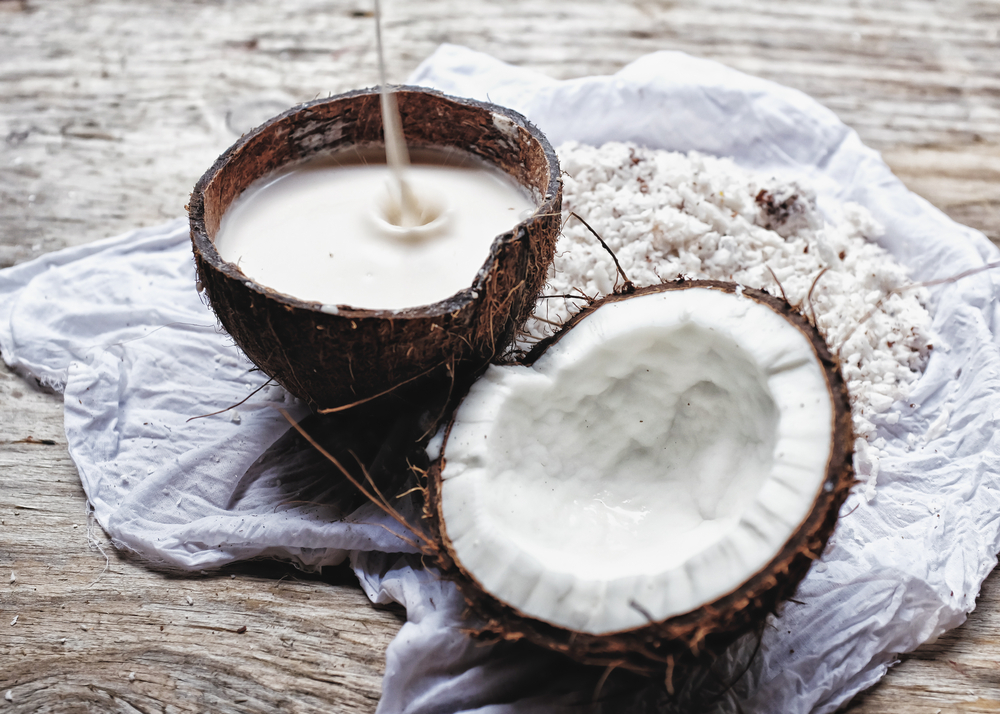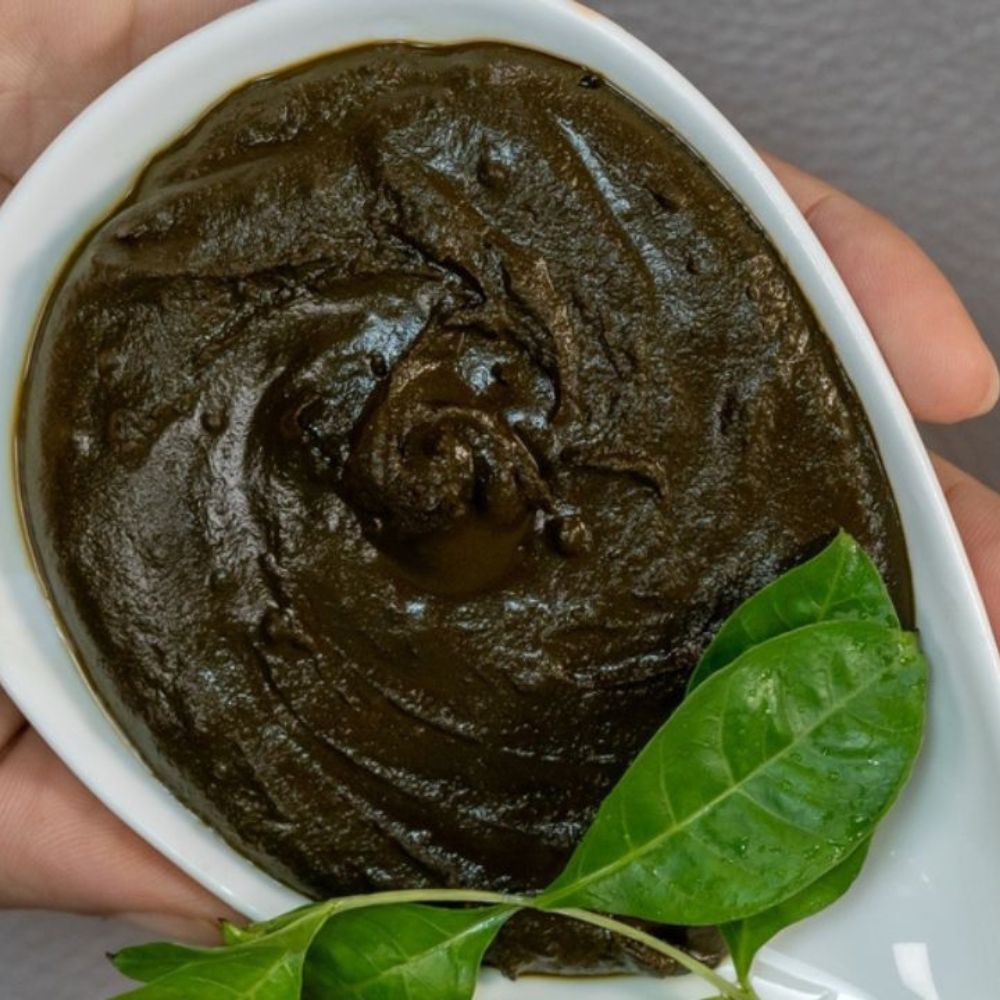Coconut Milk for Hair Growth: 9 DIY Hair Masks for Stronger Hair
Though we are aware of coconut oil’s use in hair care; let’s look at coconut milk for hair growth. Learn its benefits as you read through.

Coconut by-products have been one of the most popular natural home remedies in many Indian kitchens. However, another magical by-product is unknown for hair growth - we are talking about coconut milk for hair.
Coconut milk has been used for centuries as a natural remedy for promoting hair growth and improving overall hair health. It is extracted from the white flesh of mature coconuts and is a rich source of vitamins, minerals, and healthy fats that nourish the hair and scalp.
Once you know its benefits and how easy it is to make a DIY coconut milk hair mask, we are sure coco-nuttiness will refresh your summer!
Allow us to answer your questions and help you discover the benefits of coconut milk benefits for hair.
How to Make Coconut Milk at Home?
Coconut milk is a creamy, white liquid extracted from the grated flesh of mature coconuts. As you break into the coconut, you will find a cooling drink, the coconut water. Alongside there is a white-hard layer of flesh attached to the coconut skull, also called coconut meat, which is then mixed with water to make coconut milk.
Always opt for a fully ripped coconut and follow the steps to make fresh coconut milk at home.
- Deshell a fresh coconut and remove the flesh from the skin. Alternatively, you can use shredded coconut meat.
- Add coconut meat to a blender with hot water. The coconut meat to water ratio should be about 2:4.
- Blend the coconut meat and water until you form a smooth watery paste.
- Pour the mixture through a fine mesh strainer or cheesecloth into a large bowl.
- Squeeze out as much liquid as possible from the coconut pulp.
- You can repeat steps 2-4 with the same coconut meat and less water to create thicker, creamier coconut milk.
- Store coconut milk in an airtight container in the refrigerator for up to 5 days. However, it is best to use fresh coconut milk.
Now that your coconut milk is ready let’s get you 9 of the best coconut milk mask recipes for hair growth.
1. Coconut Milk and Honey Hair Mask

A coconut milk and honey hair mask is an excellent way to nourish your hair and promote hair growth. Coconut milk contains vitamins and minerals that strengthen hair follicles and prevent hair breakage. Honey, on the other hand, is a natural humectant that attracts and retains moisture in the hair, preventing dryness and brittleness.
Ingredients:
- 1/2 cup coconut milk
- 1 tablespoon of honey
Processing time: 30 minutes
- Mix 1/2 cup of coconut milk with 1 tablespoon of honey.
- Mix the mixture until it forms a thick paste.
- Apply the mixture starting from the scalp towards the roots.
- Massage the mixture for 5–10 minutes on the scalp.
- Leave it on for 30 minutes before rinsing with cool water and shampooing and conditioning as usual.
- To get the most effective results, use this mask once a week.
2. Coconut Milk and Aloe Vera Hair Mask
Aloe vera has been widely used as a natural remedy for hair care due to its various benefits for hair growth. Research suggests that aloe vera has enzymatic properties that can unclog hair follicles and promote hair growth (1). Aloe vera may also help increase the hair shaft diameter, which can lead to thicker and stronger hair. At the same time, coconut milk improves hair strength and elasticity and prevents hair breakage.
Ingredients:
- 1 cup coconut milk
- 2 tablespoons of aloe vera gel
Processing time: 30 minutes
- Mix 1 cup of coconut milk with 2 tablespoons of aloe vera gel in a bowl.
- Apply the mixture to your hair, focusing on the roots and ends.
- Massage the mixture into your scalp for a few minutes to improve blood circulation.
- Cover your hair with a shower cap or plastic wrap, and leave the mask on for 30 minutes.
- Rinse off the mask with lukewarm water and shampoo as usual.
- Condition your hair to seal in moisture.
- You can apply this mask once a week for 3–4 months to get noticeable results.
Note: Before using any hair mask or treatment, it's recommended to do a patch test to ensure you are not allergic to any of the ingredients.
3. Coconut Milk and Yogurt Hair Mask
Coconut milk, when complemented with yogurt, can provide a range of benefits, as the probiotic properties of yogurt can add extra shine to your hair while also promoting hair growth. According to a study, yogurt may help reduce the porosity of the hair, which can prevent damage from environmental factors such as sun exposure and pollution (2).
Ingredients:
- 1 cup coconut milk
- 1/2 cup plain yogurt
- 1 tablespoon of honey (optional).
Processing time: 30–60 min.
- In a bowl, mix the coconut milk and yogurt until well combined.
- If desired, add honey and mix again.
- Apply the mixture to your hair, starting at the roots and working your way down to the ends.
- Massage the mixture into your scalp for 5 to 10 minutes, using circular motions to stimulate blood flow and promote hair growth.
- Cover your hair with a shower cap or towel and let the mixture sit for 30–60 minutes.
- Rinse your hair thoroughly with warm water and shampoo as usual.
- Repeat this treatment once a week for maximum results.
Note: It's important to note that the longer you leave the mask on, the deeper it can penetrate your hair and provide its benefits. However, if you have very fine or thin hair, it's advisable to apply caution and not leave the mask on for too long, as it could weigh your hair down.
4. Coconut Milk and Avocado Hair Mask
Avocados work best on toast, in salads, and in dips! But what if we told you that it could be one of those superfoods you could use as a hair mask? The vitamins E, B, and amino acids from the rich fruit promote stronger and healthier hair, and biotin stimulates new hair growth (3), (4).
Ingredients:
- 1 ripe avocado
- 1/2 cup coconut milk
Processing time: 30 minutes
- Scoop one ripe avocado into a bowl and mash it until it’s smooth.
- Add 1/2 cup of coconut milk to the bowl and mix it with the mashed avocado until it is well combined.
- Apply the mixture to your hair, starting from the scalp and moving toward the ends.
- Massage the mixture into your scalp for a few minutes to improve blood circulation.
- Cover your hair with a shower cap, and leave the mask on for 30 minutes.
- Rinse off the mask with warm water and shampoo, and condition it as usual.
5. Coconut Milk and Lemon Juice Hair Mask

Vitamin C from lemon juice increases blood circulation to the scalp by removing clogged follicles, which may promote hair growth (5). When lemon juice is mixed with coconut milk, it creates a nourishing hair mask that provides elasticity and hair strength, which prevents hair breakage.
Ingredients:
- ½ cup coconut milk
- 1 tablespoon of lemon juice
- In a bowl, mix 1/2 cup of coconut milk with 1 tablespoon of fresh lemon juice.
- Stir it to make a uniform mixture.
- Gently massage the mixture into your scalp.
- Leave the mask on for 30 minutes, and make sure to cover it with a shower cap.
- Rinse off the mask with warm water and shampoo as usual.
- Condition your hair to seal in moisture.
- You can apply the mask once a week.
6. Thick Coconut Milk Hair Mask
If you want to rejuvenate your hair and keep it healthy and shiny naturally without applying any chemicals, then this one's for you. The lauric acid in coconut milk helps strengthen your hair follicles, while the vitamins may reduce split ends (6).
Ingredients:
- 1 cup of coconut milk
Processing time: 30 minutes
- Prepare coconut milk the night before application.
- Put the prepared coconut milk in the refrigerator.
- Low temperatures will allow milk to thicken, and you can apply it to the scalp thereafter.
- You can apply milk to damp hair or dry scalp.
- Let it sit for 30 minutes to an hour.
- Wash it with a nourishing shampoo.
7. Coconut Milk and Fenugreek Hair Mask
The methi seeds, also known as fenugreek, share a range of benefits, from improving baldness and hair loss to getting rid of an itchy scalp. The kitchen staple may do wonders for your hair as it is a rich source of nicotinic acid, which promotes hair growth, and lecithin for a healthier hair follicle.
Ingredients:
- 1 tablespoon of fenugreek seeds
- Coconut oil
- Coconut milk
Processing time: 30 minutes
- Take one tablespoon of fenugreek seeds and boil it in 1/4 cup of coconut oil.
- Let it boil until the seeds turn red.
- Mix the fenugreek-infused coconut oil with a half cup of thick coconut milk.
- Apply this wonderful concoction to your scalp and massage it for 5–10 minutes.
- Do this once a week to get fruitful results.
8. Coconut Milk and Hibiscus Flower Hair Mask
A study published in the Journal of Ethnopharmacology found that hibiscus extracts contain high amounts of polyphenols, which have been shown to have antioxidant and anti-inflammatory properties that can protect hair follicles from damage and promote hair growth by stimulating keratin production (8).
Ingredients:
- 1/2 cup coconut milk
- 1/4 cup of hibiscus flowers
- 1 tablespoon of honey (optional).
Processing time: 30 minutes
- In a bowl, mix 1/2 cup of coconut milk with 1/4 cup of hibiscus flowers.
- Blend the mixture until the hibiscus flowers are finely ground until the mixture is smooth.
- Add 1 tablespoon of honey to the mixture (optional) and stir well.
- Apply the mixture to your hair, starting from the scalp towards the end.
- Massage the mixture into your scalp for a few minutes to improve blood circulation.
- Cover your hair with a shower cap to prevent any dirt collection.
- Rinse off the mask with warm water and shampoo as usual.
- Condition your hair to seal in moisture.
9. Coconut Milk and Onion Juice Hair Mask
Onions make you cry, but not when applied as a hair mask. Onions contain sulfur and quercetin, which promote hair growth. In addition to being high in sulfur, keratin is the protein that strengthens our hair. However, its deficiency can lead to frizzy and brittle hair; the sulfur from onions could fill the keratin deficiency and promote hair growth. In addition, the richness of vitamin C, manganese, folic acid, biotin, etc nourishes the hair follicle and stops hair loss (9).
Ingredients:
- 1 medium-sized onion
- Cheesecloth
- Coconut milk
Processing time: 30 minutes
- Chop 1 medium-sized onion and blend in a blender.
- Squeeze the smooth paste through a cheese or a muslin cloth.
- The juice that comes out of the cloth is of use.
- Mix 5 tablespoons of onion juice into ½ cup of coconut milk.
- Apply the mixture to the scalp and let it sit for 30 minutes.
- Wash the mask with a nourishing shampoo and apply a conditioner to lock in the moisture.
- This mask can be applied 3-4 times a week.
Note: No matter what mask you choose to apply, always make sure to do a patch test. This prevents any ill effects on your hair, and you can find the one that best suits you.
Benefits of Coconut Milk for the Hair
- Nourishes Hair Follicles: Coconut milk is rich in nutrients such as vitamins, minerals, and fatty acids that nourish hair follicles and promote healthy hair growth (6).
- Strengthens Hair Strands: The proteins in coconut milk can strengthen hair strands, preventing breakage and promoting longer, healthier hair (6).
- Conditions Hair: Coconut milk is a great natural conditioner that can help hydrate and moisturize hair, preventing dryness and damage.
- Improves Scalp Health: The antimicrobial and anti-inflammatory properties of coconut milk may help soothe and heal scalp conditions such as dandruff, which can promote healthier hair growth (10).
- Increases Blood Circulation: The nutrients in coconut milk can increase blood circulation in the scalp, which can help promote healthy hair growth.
Coconut milk is an excellent source of several vitamins and minerals, including:
- Vitamins: Coconut milk contains vitamins C, E, and B6, which nourish and strengthen hair.
- Minerals: Coconut milk is rich in minerals such as iron, magnesium, and potassium, which can improve hair health.
- Fatty Acids: Coconut milk is high in medium-chain fatty acids, such as lauric acid, which can help promote hair growth and prevent hair loss (11).

Conclusion:
Coconut milk is a lesser-known byproduct of coconut. The benefits of coconut milk for hair growth are varied. It has high-fat content, vitamins, and minerals, providing essential nutrients that nourish hair follicles and strengthen strands. Incorporating coconut milk into your hair care routine, either as a hair mask or a leave-in conditioner, may improve the hair’s overall health and appearance. For instance, the easiest DIY hair mask with coconut milk is using it as it is or with lemon juice. The recipes mentioned above may result in shinier, smoother hair and significant hair growth when applied religiously. However, it is important to know that not all DIY masks work for you. If hair fall continues, one must seek medical help immediately.
Source:
1. Aloe vera: Potential candidate in health management via modulation of biological activities
https://pubmed.ncbi.nlm.nih.gov/26392709/
2. Probiotic Bacteria Induce a ‘Glow of Health’
https://www.ncbi.nlm.nih.gov/pmc/articles/PMC3547054/
3. Hass Avocado Composition and Potential Health Effects
https://www.tandfonline.com/doi/full/10.1080/10408398.2011.556759
4. The Role of Vitamins and Minerals in Hair Loss: A Review
https://www.ncbi.nlm.nih.gov/pmc/articles/PMC6380979/
5. Citrus limon (Lemon) Phenomenon—A Review of the Chemistry, Pharmacological Properties, Applications in the Modern Pharmaceutical, Food, and Cosmetics Industries, and Biotechnological Studies
https://www.ncbi.nlm.nih.gov/pmc/articles/PMC7020168/
6. Production of coconut milk: A sustainable alternative plant-based milk
https://www.sciencedirect.com/science/article/pii/S2666016422000287
7. Effectiveness of Fenugreek Seed Paste on Dandruff among Adolescent Girls in Selected Women’s Hostel, Coimbatore
8. An update review on Hibiscus rosa sinensis phytochemistry and medicinal uses
https://www.ayurvedjournal.com/JAHM_201843_08.pdf
9. Onion juice (Allium cepa L.), a new topical treatment for alopecia areata
https://pubmed.ncbi.nlm.nih.gov/12126069/
10. In vitro anti-inflammatory and skin protective properties of Virgin coconut oil
https://www.ncbi.nlm.nih.gov/pmc/articles/PMC6335493/
11. How well do plant based alternatives fare nutritionally compared to cow’s milk?
https://www.ncbi.nlm.nih.gov/pmc/articles/PMC5756203/





 JOIN OUR WHATSAPP CHANNEL
JOIN OUR WHATSAPP CHANNEL






























































